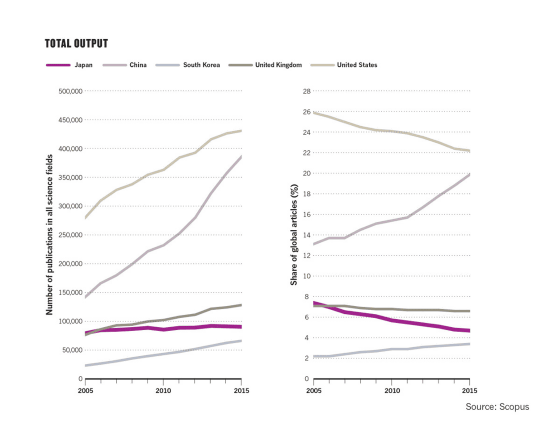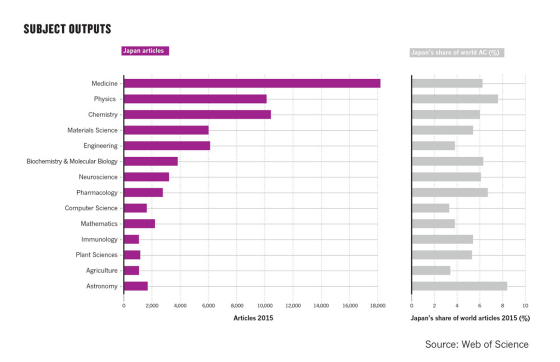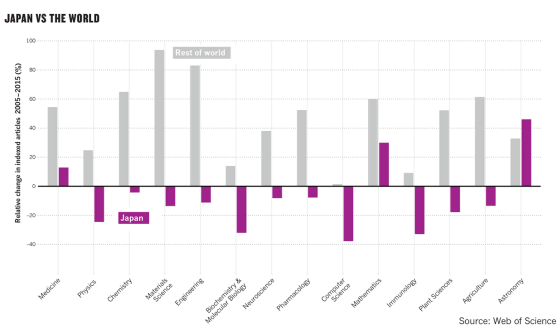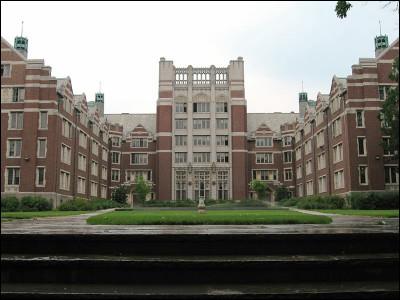This stall in Japan's scientific research is represented by five graphs

BySharon Drummond
Japan was counted as one of the scientific developed countries, but in the special issue brochure "Nature Index 2017 Japan" of 23rd Nature 2017,A stall in Japanese scientific research points outIt was done. Then,Nature Index"5 charts showing that Japanese research slowly descends" is also released.
The slow decline of Japanese research in 5 charts
http://www.natureindex.com/news-blog/the-slow-decline-of-japanese-research-in-five-charts
Nature Index 2017 Japan | Supplements | Nature Index
https://www.natureindex.com/supplements/nature-index-2017-japan/index
It is obvious from Nature Index 2017 Japanese version that Japanese scientific research has stalled in the past 10 years and the scientific community's position as an elite is threatened | Nature Research
http://www.natureasia.com/ja-jp/info/press-releases/detail/8622
First, let's look at the pace of publication of the overall paper. The following graph shows the number of publications of papers from 2005 to 2015 in five scientific advanced countries of Japan, China, South Korea, UK and America. The graph on the left shows the change in the number of articles in each country published in the science field and the graph on the right shows the proportion of the number of paper publications in each country in the number of publications in the world worldwide. The number of publications in Japan is represented by a purple line, and the number of publications from 2005 to 2015 is flat. However, as the number of publications worldwide is increasing year by year, it is clear that the proportion of the whole is declining. It should be noted that the graph shows the cited reference database "Scopus"Although the total number of papers on Scopus has increased by 80% from 2005 to 2015, the number of papers in Japan has only been increased by 14% .

In addition, in the graphs below, the vertical axis shows the number of publications of high quality papers and the horizontal axis shows each year, and from 2012 to 2016 the change in world market share of high quality papers in Japan, China, South Korea, UK, USA Respectively. The world share of Japanese high quality papers shown by a purple graph is decreasing, and it is America that shows a decrease in market share like Japan. China and the UK are on the rise.

Look at only the "number change" of the paper which was published in Japan from 2005 to 2015. It is increasing and decreasing once again in 2010, while decreasing it by a large number, but when comparing 2005 and 2015, it is about the same for 75,569 cases and 70,4881 books. Since the average number from 2005 to 2015 is 70,555, figures in 2015 are close to the average.

The following purple graph is a classification of Japanese papers published in 2015 by academic disciplines, with the vertical axis from the top, Pharmaceutical, Physics, Chemistry, Materials Science, Engineering, Biochemistry & Molecular Biology, Neuroscience · Pharmacology · Computer science · Mathematics · Immunology · Plant science · Agriculture · Astronomy, horizontal axis shows the number of publications. The gray graph beside it shows how much the proportion of articles in each field of Japan occupies publications published worldwide. Although there are many pharmacies as numbers, it is the astronomy that the world share share is high.

The graph below shows the relative fluctuations of world research and Japanese studies in each of the above fields. In 13 of the 14 sectors Japan has been lagging behind the world average pace but in medicine · mathematics · astronomy the number of papers has increased from 2005, the astronomy field is better than the world average It is getting.

However, in the field of material science and engineering where Japan is traditionally strong, the number of publications has decreased by 10%, and in biochemistry & molecular biology / computer science / immunology, more than 30% of the number of publications Has been decreasing as the number of people is decreasing.
Anders Karlsson, vice president of Elsevier publishing content on medicine and science and technology, said that Japan has lost world share more than a third in the past 10 years "Since 2000, Japan has become a science field 17 has also won the Nobel Prize, but the fact that the population of Japan itself is decreasing has led to a decrease in researchers, and the fact that no increase in investment in research affects performance is also affected. " analysis. "Japan also loses worldwide market share, thereby losing worldwide impact."
Related Posts:
in Science, Posted by darkhorse_log







